The BEST episodes of TED Talks season 2018
Every episode of TED Talks season 2018, ranked from best to worst by thousands of votes from fans of the show. The best episodes of TED Talks season 2018!
TED is a nonprofit devoted to Ideas Worth Spreading. It started out (in 1984) as a conference bringing together people from three worlds: Technology, Entertainment, Design. TEDTalks began as a simple attempt to share what happens at TED with the world. Under the moniker "ideas worth spreading," talks were released online. They rapidly attracted a global audience in the millions. Indeed, the reaction was so enthusiastic that the entire TED website has been reengineered around TEDTalks, with the goal of giving everyone on-demand access to the world's most inspiring voices. [TED-Ed and TEDx are separate TVDB series and should NOT be listed here. Episode ordering and dates are sourced from YouTube.]
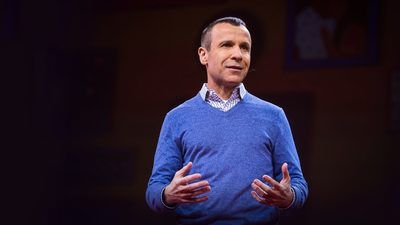
#1 - Guy Winch: How to fix a broken heart
Season 2018 - Episode 37 - Aired 2/5/2018
At some point in our lives, almost every one of us will have our heart broken. Imagine how different things would be if we paid more attention to this unique emotional pain. Psychologist Guy Winch reveals how recovering from heartbreak starts with a determination to fight our instincts to idealize and search for answers that aren't there -- and offers a toolkit on how to, eventually, move on. Our hearts might sometimes be broken, but we don't have to break with them.
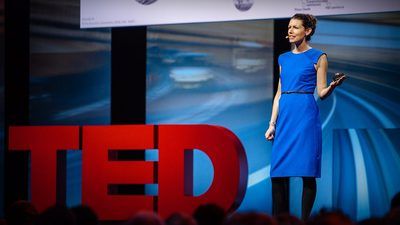
#2 - Karen Lloyd: This deep-sea mystery is changing our understanding of life
Season 2018 - Episode 38 - Aired 2/6/2018
How deep into the Earth can we go and still find life? Marine microbiologist Karen Lloyd introduces us to deep-subsurface microbes: tiny organisms that live buried meters deep in ocean mud and have been on Earth since way before animals. Learn more about these mysterious microbes, which refuse to grow in the lab and seem to have a fundamentally different relationship with time and energy than we do.
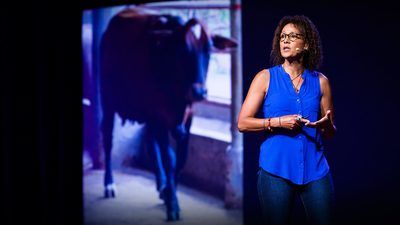
#3 - Su Kahumbu: How we can help hungry kids, one text at a time
Season 2018 - Episode 38 - Aired 2/6/2018
Su Kahumbu raises badass cows — healthy, well-fed animals whose protein is key to solving a growing crisis in Africa: childhood nutritional stunting. With iCow, a simple SMS service she developed to support small-scale livestock farmers, the TED Fellow is helping farmers across the continent by texting them tips on caring for and raising animals. Learn more about how this cheap innovation is helping feed hungry kids, one text at a time.
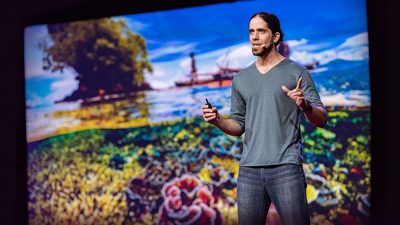
#4 - Mike Gil: Could fish social networks help us save coral reefs?
Season 2018 - Episode 31 - Aired 1/30/2018
Mike Gil spies on fish: using novel multi-camera systems and computer vision technology, the TED Fellow and his colleagues explore how coral reef fish behave, socialize and affect their ecosystems. Learn more about how fish of different species communicate via social networks -- and what disrupting these networks might mean to the delicate ecology of reefs, which help feed millions of us and support the global economy.
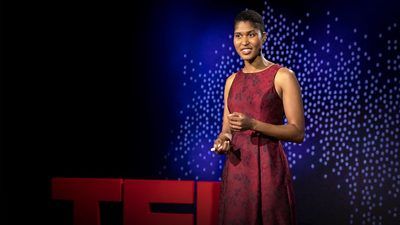
#5 - Danielle Wood: 6 space technologies we can use to improve life on Earth
Season 2018 - Episode 34 - Aired 2/1/2018
Danielle Wood leads the Space Enabled research group at the MIT Media Lab, where she works to tear down the barriers that limit the benefits of space exploration to only the few, the rich or the elite. She identifies six technologies developed for space exploration that can contribute to sustainable development across the world -- from observation satellites that provide information to aid organizations to medical research on microgravity that can be used to improve health care on Earth. "Space truly is useful for sustainable development for the benefit of all peoples," Wood says.
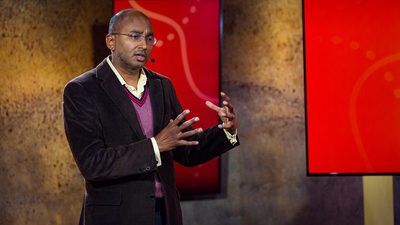
#6 - Bhu Srinivasan: Capitalism isn't an ideology -- it's an operating system
Season 2018 - Episode 44 - Aired 2/12/2018
Bhu Srinivasan researches the intersection of capitalism and technological progress. Instead of thinking about capitalism as a firm, unchanging ideology, he suggests that we should think of it as an operating system — one that needs upgrades to keep up with innovation, like the impending take-off of drone delivery services. Learn more about the past and future of the free market (and a potential coming identity crisis for the United States' version of capitalism) with this quick, forward-thinking talk.
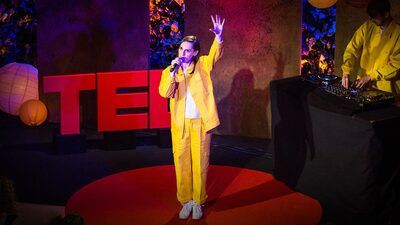
#7 - Yelle: "Interpassion" / "Ba$$in"
Season 2018 - Episode 235 - Aired 8/20/2018
Yelle and GrandMarnier bring their danceable electropop hits to the TED stage in an energizing performance of two songs, "Interpassion" and "Ba$$in."
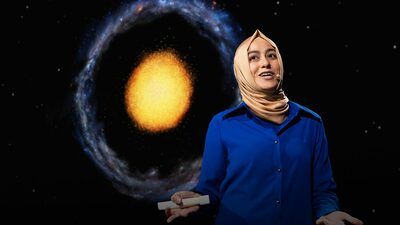
#8 - Burçin Mutlu-Pakdil: A rare galaxy that's challenging our understanding of the universe
Season 2018 - Episode 244 - Aired 8/28/2018
What's it like to discover a galaxy — and have it named after you? Astrophysicist and TED Fellow Burçin Mutlu-Pakdil lets us know in this quick talk about her team's surprising discovery of a mysterious new galaxy type.
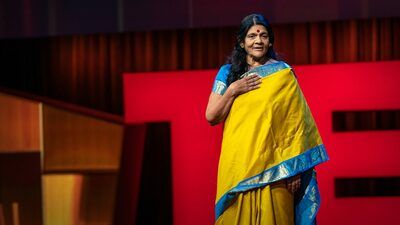
#9 - Chetna Gala Sinha: How women in rural India turned courage into capital
Season 2018 - Episode 236 - Aired 8/20/2018
When bankers refused to serve her neighbors in rural India, Chetna Gala Sinha did the next best thing: she opened a bank of her own, the first ever for and by women in the country. In this inspiring talk, she shares stories of the women who encouraged her and continue to push her to come up with solutions for those denied traditional financial backing.
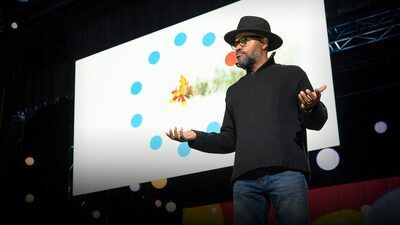
#10 - Stephen DeBerry: Why the "wrong side of the tracks" is usually the east side of cities
Season 2018 - Episode 237 - Aired 8/21/2018
What do communities on the social, economic and environmental margins have in common? For one thing, they tend to be on the east sides of cities. In this short talk about a surprising insight, anthropologist and venture capitalist Stephen DeBerry explains how both environmental and man-made factors have led to disparity by design in cities from East Palo Alto, California to East Jerusalem and beyond — and suggests some elegant solutions to fix it.
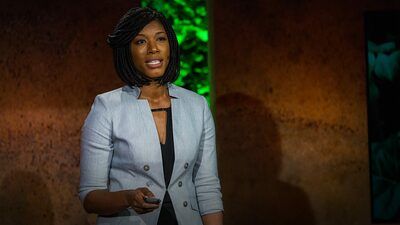
#11 - Jessica Pryce: To transform child welfare, take race out of the equation
Season 2018 - Episode 238 - Aired 8/21/2018
In this eye-opening talk about the impact of race and neighborhood on foster-care decisions, social worker Jessica Pryce shares a promising solution to help child welfare agencies make bias-free assessments about when to remove children from their families. "Let's work together to build a system that wants to make families stronger instead of pulling them apart," Pryce says.
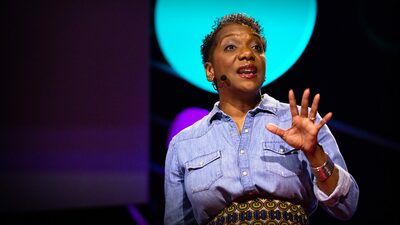
#12 - Janet Stovall: How to get serious about diversity and inclusion in the workplace
Season 2018 - Episode 239 - Aired 8/22/2018
Imagine a workplace where people of all colors and races are able to climb every rung of the corporate ladder — and where the lessons we learn about diversity at work actually transform the things we do, think and say outside the office. How do we get there? In this candid talk, inclusion advocate Janet Stovall shares a three-part action plan for creating workplaces where people feel safe and expected to be their unassimilated, authentic selves.
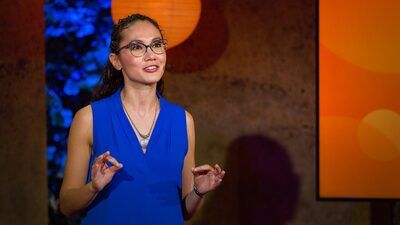
#13 - Leticia Gasca: Don't fail fast -- fail mindfully
Season 2018 - Episode 240 - Aired 8/23/2018
We celebrate bold entrepreneurs whose ingenuity led them to success, but what happens to those who fail? Far too often, they bury their stories out of shame or humiliation — and miss out on a valuable opportunity for growth, says author and entrepreneur Leticia Gasca. In this thoughtful talk, Gasca calls for business owners to open up about their failures and makes the case for replacing the idea of "failing fast" with a new mantra: fail mindfully.
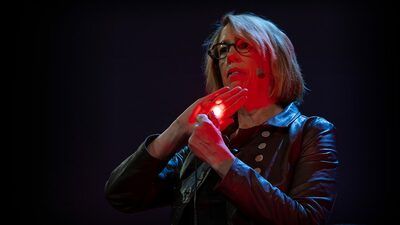
#14 - Mary Lou Jepsen: How we can use light to see deep inside our bodies and brains
Season 2018 - Episode 241 - Aired 8/24/2018
In a series of mind-bending demos, inventor Mary Lou Jepsen shows how we can use red light to see and potentially stimulate what's inside our bodies and brains. Taking us to the edge of optical physics, Jepsen unveils new technologies that utilize light and sound to track tumors, measure neural activity and could possibly replace the MRI machine with a cheaper, more efficient and wearable system.
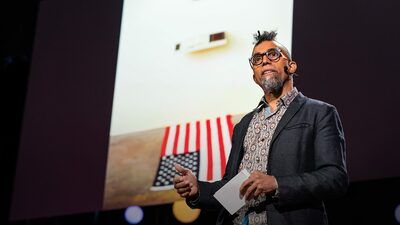
#15 - Dread Scott: How art can shape America's conversation about freedom
Season 2018 - Episode 242 - Aired 8/27/2018
In this quick talk, visual artist Dread Scott tells the story of one of his most transgressive art installations, which drew national attention for its controversial use of the American flag and led to a landmark First Amendment case in the US Supreme Court.
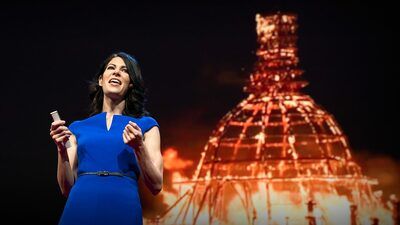
#16 - Nora Atkinson: Why art thrives at Burning Man
Season 2018 - Episode 243 - Aired 8/28/2018
Craft curator Nora Atkinson takes us on a trip to Nevada's Black Rock Desert to see the beautifully designed and participatory art of Burning Man, revealing how she discovered there what's often missing from museums: curiosity and engagement. "What is art for in our contemporary world if not this?" she asks.
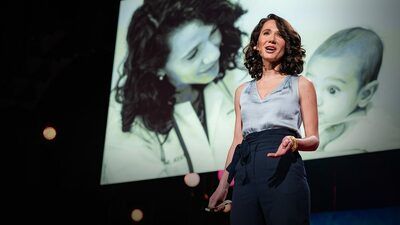
#17 - Lucy Marcil: Why doctors are offering free tax prep in their waiting rooms
Season 2018 - Episode 224 - Aired 7/23/2018
More than 90 percent of children in the US see a doctor at least once a year, which means countless hours spent in waiting rooms for parents. What if those hours could be used for something productive — like saving money? Through her organization StreetCred, pediatrician and TED Fellow Lucy Marcil is offering free tax prep to parents right in the waiting room, reimagining what a doctor's visit can look like and helping to lift families out of poverty. Learn more about how free tax prep and guidance could be the best poverty prescription we have in the US.
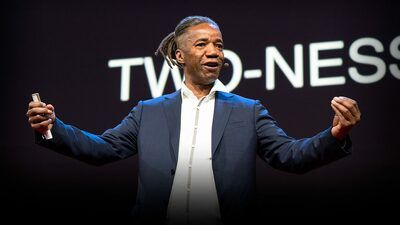
#18 - Walter Hood: How urban spaces can preserve history and build community
Season 2018 - Episode 234 - Aired 8/17/2018
Can public spaces both reclaim the past and embrace the future? Landscape architect Walter Hood has explored this question over the course of an iconic career, with projects ranging from Lafayette Square Park in San Francisco to the upcoming International African American Museum in Charleston, South Carolina. In this inspiring talk packed with images of his work, Hood shares the five simple concepts that guide his approach to creating spaces that illuminate shared memories and force us to look at one another in a different way.
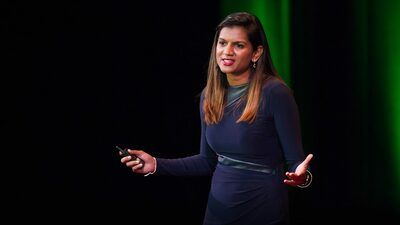
#19 - Hasini Jayatilaka: How cancer cells communicate -- and how we can slow them down
Season 2018 - Episode 233 - Aired 8/16/2018
When cancer cells are closely packed together in a tumor, they're able to communicate with each other and coordinate their movement throughout the body. What if we could interrupt this process? In this accessible talk about cutting-edge science, Hasini Jayatilaka shares her work on an innovative method to stop cancer cells from communicating — and halt their fatal ability to spread.
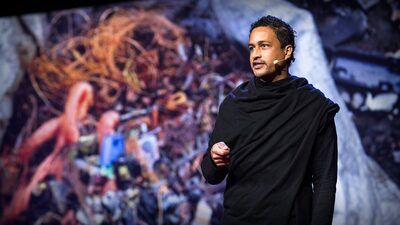
#20 - DK Osseo-Asare: What a scrapyard in Ghana can teach us about innovation
Season 2018 - Episode 232 - Aired 8/16/2018
In Agbogbloshie, a community in Accra, Ghana, people descend on a scrapyard to mine electronic waste for recyclable materials. Without formal training, these urban miners often teach themselves the workings of electronics by taking them apart and putting them together again. Designer and TED Fellow DK Osseo-Asare wondered: What would happen if we connected these self-taught techies with students and young professionals in STEAM fields? The result: a growing maker community where people engage in peer-to-peer, hands-on education, motivated by what they want to create. Learn more about how this African makerspace is pioneering a grassroots circular economy.
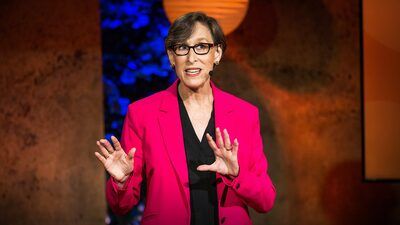
#21 - Tina Seelig: The little risks you can take to increase your luck
Season 2018 - Episode 231 - Aired 8/14/2018
Luck is rarely a lightning strike, isolated and dramatic — it's much more like the wind, blowing constantly. Catching more of it is easy but not obvious. In this insightful talk, Stanford engineering school professor Tina Seelig shares three unexpected ways to increase your luck — and your ability to see and seize opportunities.
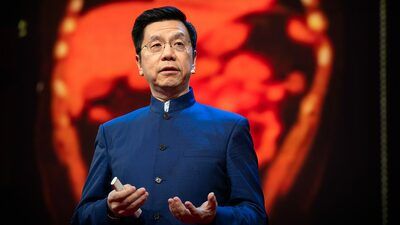
#22 - Kai-Fu Lee: How AI can save our humanity
Season 2018 - Episode 230 - Aired 8/13/2018
AI is massively transforming our world, but there's one thing it cannot do: love. In a visionary talk, computer scientist Kai-Fu Lee details how the US and China are driving a deep learning revolution — and shares a blueprint for how humans can thrive in the age of AI by harnessing compassion and creativity. "AI is serendipity," Lee says. "It is here to liberate us from routine jobs, and it is here to remind us what it is that makes us human."
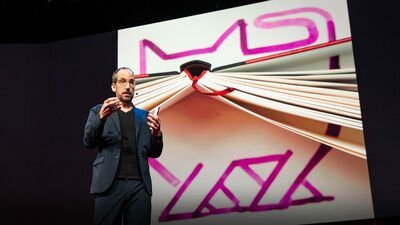
#23 - Christoph Niemann: You are fluent in this language (and don't even know it)
Season 2018 - Episode 229 - Aired 7/27/2018
Without realizing it, we're fluent in the language of pictures, says illustrator Christoph Niemann. In a charming talk packed with witty, whimsical drawings, Niemann takes us on a hilarious visual tour that shows how artists tap into our emotions and minds — all without words.
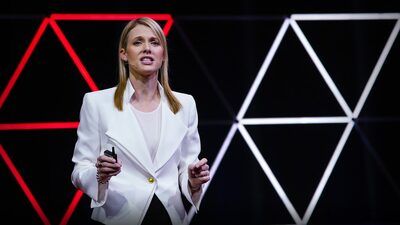
#24 - Bronwyn King: You may be accidentally investing in cigarette companies
Season 2018 - Episode 228 - Aired 7/26/2018
Tobacco causes more than seven million deaths every year — and many of us are far more complicit in the problem than we realize. In a bold talk, oncologist Dr. Bronwyn King tells the story of how she uncovered the deep ties between the tobacco industry and the entire global finance sector, which invests our money in cigarette companies through big banks, insurers and pension funds. Learn how Dr. King has ignited a worldwide movement to create tobacco-free investments and how each of us can play a role in ending this epidemic.
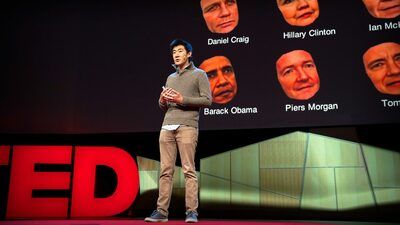
#25 - Supasorn Suwajanakorn: Fake videos of real people -- and how to spot them
Season 2018 - Episode 227 - Aired 7/25/2018
Do you think you're good at spotting fake videos, where famous people say things they've never said in real life? See how they're made in this astonishing talk and tech demo. Computer scientist Supasorn Suwajanakorn shows how, as a grad student, he used AI and 3D modeling to create photorealistic fake videos of people synced to audio. Learn more about both the ethical implications and the creative possibilities of this tech — and the steps being taken to fight against its misuse.